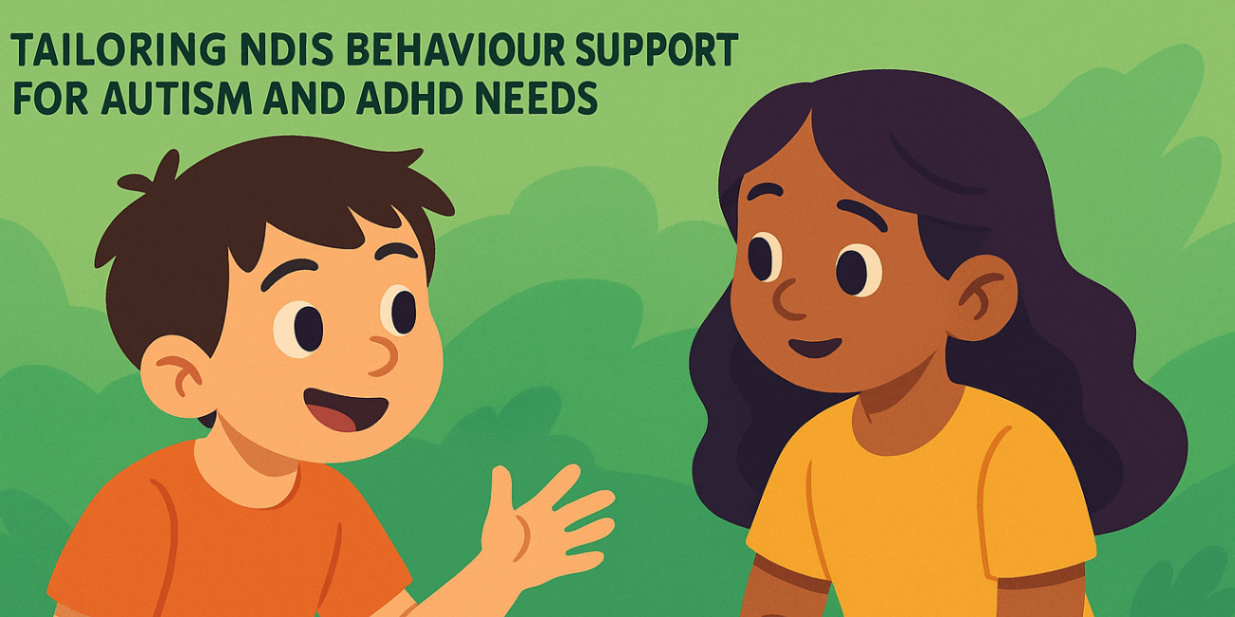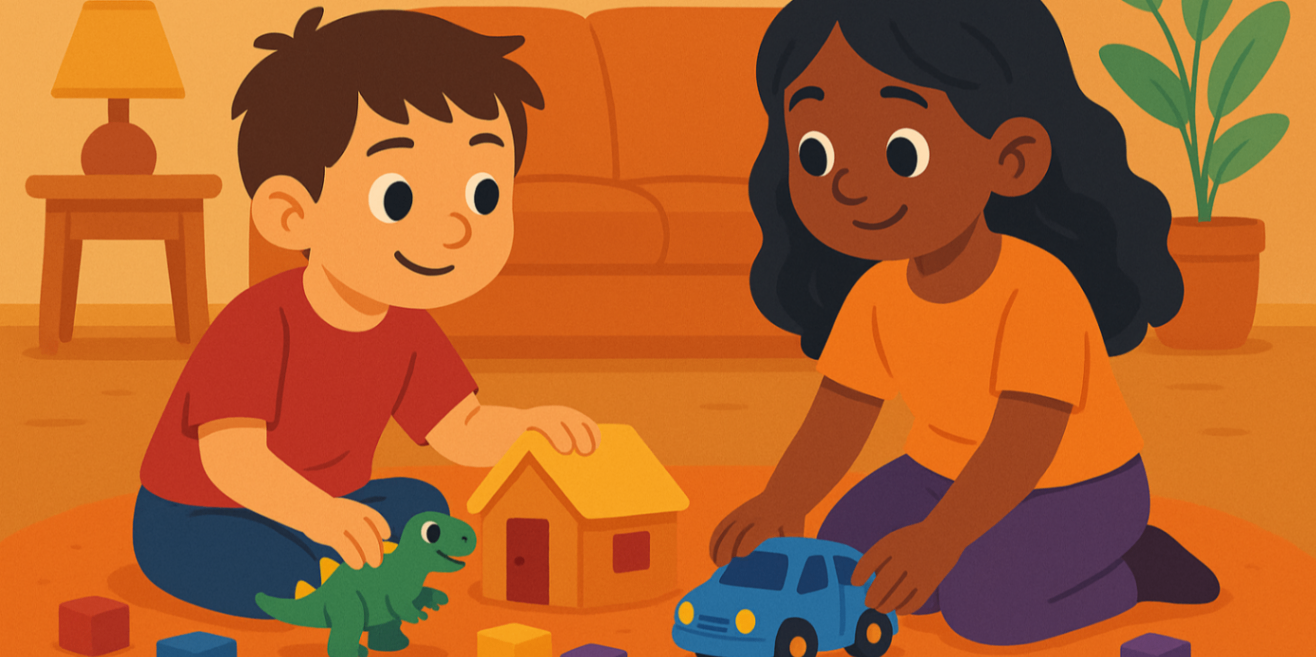
tailoring ndis behaviour support for autism and adhd needs
24 July, 2025
Introduction
Navigating the world of NDIS behaviour support for people with autism and ADHD can be tough. Yet, with NDIS behaviour support, families discover hope and clarity. By crafting a unique plan for your child, you move beyond “managing” challenges to unlocking real potential. Through proven methods like Applied Behaviour Analysis and Positive Behaviour Support, your child will gain communication skills, emotional regulation and confidence—one milestone at a time.
Key Highlights
-
Empowering Growth: Personalised strategies that foster skill-building and reduce distressing behaviours.
-
Family-Centred Plans: Collaborative design ensures real-world success at home, school and in the community.
-
Evidence-Based Techniques: Tools like ABA and PBS adapted to each child’s profile.
-
Emotional Well‑Being: Supports that nurture confidence, resilience and belonging.
-
Seamless Integration: Interventions woven into daily life, promoting independence and joy.
Understanding NDIS Behaviour Support in Australia

In Australia, NDIS behaviour support is designed to transform lives, not just manage behaviours. Registered practitioners assess each child’s strengths, triggers and aspirations to create a holistic plan. With NDIS behaviour support, children learn to communicate their needs, regulate overwhelming emotions and engage more meaningfully with friends, family and community.
Early access to NDIS behaviour support means your child begins building vital skills sooner—setting the stage for a lifetime of achievements.
Key Principles of NDIS Behaviour Support
-
Person‑Centered Planning
-
Deep understanding of your child’s unique profile
-
Goals co‑created with families, focusing on meaningful outcomes
-
-
Positive Reinforcement & Early Intervention
-
Celebrating every success, big or small
-
Addressing challenges before patterns become entrenched
-
-
Natural Environment Focus
-
Tailoring strategies for home, school and community settings
-
Promoting generalisation of skills across daily routines
-
-
Data‑Driven Adjustments
-
Ongoing review and adaptation to reflect your child’s growth
-
Transparent progress tracking keeps families informed and empowered
-
Eligibility and Access for Autism and ADHD
To access ndis behaviour support for children, a formal assessment and diagnosis by qualified professionals is required. Once approved, your plan funds tailored interventions aimed at positive change. Early engagement with ndis behaviour support for children often leads to faster progress, reducing frustration for both children and caregivers.
Behavioural Challenges in Autism and ADHD
 Challenging behaviours can show up in different ways for autistic children and those who have ADHD. That is why there is a need for different behaviour management strategies to help each child. Children with autism may find it hard to handle their emotions, which can lead to meltdowns or shutting down. On the other hand, children with ADHD may have trouble with self-control or paying attention. It is important to know about these details to make behaviour management strategies that work. Early intervention is key. It can help children build communication and social skills early on. This may improve the quality of life for children and their families in supportive places.
Challenging behaviours can show up in different ways for autistic children and those who have ADHD. That is why there is a need for different behaviour management strategies to help each child. Children with autism may find it hard to handle their emotions, which can lead to meltdowns or shutting down. On the other hand, children with ADHD may have trouble with self-control or paying attention. It is important to know about these details to make behaviour management strategies that work. Early intervention is key. It can help children build communication and social skills early on. This may improve the quality of life for children and their families in supportive places.
Common Behavioural Issues in Autism
Difficult behaviour often shows up in autistic children. This can be meltdowns or pulling away from others. Many of these things happen because they find it hard to manage their feelings or use good communication skills. Early intervention makes a big difference and helps to build a supportive environment where positive behaviour can grow.
Behaviour support practitioners use behaviour analysis. They make customised behaviour support plans by using applied behaviour analysis (ABA). These plans are made to fit each person's needs.
By using positive reinforcement, caregivers can help young people learn new skills. This helps them have a better quality of life. It also lets them get along better with people in their natural environment.
Unique Behavioural Needs in ADHD
People with Attention Deficit Hyperactivity Disorder (ADHD) have needs in behaviour that are different from some others. They might have trouble with things like impulsive actions, not paying attention, or being too active. These things can get in the way when they try to work on social skills or emotional regulation with others.
It is important to use behaviour support that fits the person’s needs. Positive behaviour support (PBS) can help by building positive behaviour and growing good communication skills. This approach tries to use reinforcement to help people show appropriate behaviour.
The best way to help is to understand what each person needs. When there is early intervention, people get support fast and can make their quality of life better in a supportive environment. This makes it easier for them to enjoy life, fit in, and feel good about what they can do.
Personalising Behaviour Support Strategies

Providing tailored behaviour support is very important when helping people with autism and ADHD. A good behaviour support plan should be put together by behaviour support practitioners. This plan will use behaviour analysis, applied behaviour analysis, and positive reinforcement. With the plan, the focus will be on improving communication skills and helping with emotional regulation. Caregivers can use these tools to make a supportive environment. This will help people show more appropriate behaviour.
Every child deserves a plan that reflects their personality, interests and learning style. Behaviour support practitioners collaborate closely with you to:
-
Conduct functional assessments to pinpoint triggers
-
Design rewarding routines that build desired skills
-
Equip caregivers with simple, clear techniques for everyday use
By embedding behaviour support for children into daily life, you create an environment where new skills flourish naturally.
Adapting Interventions for Autism
Helping people with autism means looking at what each person needs and faces. Positive behaviour support, or PBS, is useful to improve communication skills and emotional regulation. This can help build a supportive environment for young people.
When practitioners use behaviour analysis, they can make a good behaviour support plan. This plan uses positive reinforcement to help young people use more appropriate behaviour. Adapting these strategies to fit a natural environment lets them try out new skills in real-life situations. This support also helps to improve social skills and the quality of life for young people with autism. Over time, using positive behaviour support in day-to-day life can make things better for them and those around them.
Tailoring Approaches for ADHD
To help kids with ADHD, it is important to use behaviour support methods that work for what each child needs. There should be a focus on positive behaviour support, with behaviour management strategies that fit the person very well. Working on better communication skills and building up social interaction can help with challenging behaviours.
Having a clear behaviour support plan, made with caregivers and behaviour support practitioners, helps with early intervention. This plan can support emotional regulation and allow the child’s progress to happen in a supportive environment. When there are regular check-ins and changes to the plan, the interventions keep working well. All of this aims to improve the quality of life for young NDIS participants.
Collaborating with Families and Carers
Your insights are invaluable. You know your child’s cues, interests and moments of joy better than anyone. Through regular check‑ins and collaborative problem‑solving, NDIS behaviour support becomes a true partnership:
-
Home Consistency: Establish predictable routines that reduce anxiety.
-
School Collaboration: Align with teachers to reinforce strategies in the classroom.
-
Community Engagement: Foster social opportunities that build confidence and belonging.
When families and practitioners unite, children feel supported, understood and motivated to thrive.
Involving Families in Behaviour Support Planning
Working with families is very important when it comes to building good behaviour support plans. Involving caregivers helps to make sure that these plans fit with each person’s needs. This also helps them use positive behaviour support at home. Getting family input helps people to better understand challenging behaviours. It also helps in teaching emotional regulation skills. When their feedback is included, you can make a detailed plan. This plan helps with communication and the growth of social skills. This kind of teamwork does not just build a stronger support system. It also makes life better for NDIS participants by improving their quality of life.
Caregivers play a key role in this work with NDIS, helping us deal with behaviour in ways that work for everyone.
Building Consistency Across Home, School, and Community
|
Setting |
Strategies |
|---|---|
|
Home |
Set up set routines for every day tasks. Use a design at home that is easy for the senses and keeps things steady. |
|
School |
Bring in interactive ways so all the students can join in. Keep communication steady between the school team and families. |
|
Community |
Add group learning for everyone. Plan regular fun activities that offer support and positivity. |
When goals match in the home, school, and community, there is a better quality of life for everyone involved.
Conclusion
Choosing the right NDIS behaviour support sets the foundation for lasting progress and well‑being. By embracing personalised, evidence‑based strategies—together with your child’s enthusiasm and your unwavering dedication—you’ll witness real transformation. Ready to discover how tailored behaviour support can open new doors for your family?
Book your consultation now and take the first step toward a brighter, more confident future for your child.
Frequently Asked Questions
How does NDIS funding work for behaviour support?
NDIS funding for behaviour support helps people with autism and ADHD get the support they need. This funding covers approved services such as therapy and behaviour assessments. With this help, people can get care that fits what they need. The support is made to help with their own behaviour challenges. It lets them get the most out of their NDIS plan and improve their daily life.
What qualifications should a behaviour support practitioner have?
A behaviour support practitioner needs to have the right qualifications. They should have a degree in psychology, social work, or special education. They also need special training in positive behaviour support. On top of that, it is good if they have experience working with people who have autism or ADHD. This will help them to build better ways to help others with their behaviour. Having all of these will make their positive behaviour support more effective.
How are goals set and measured in an NDIS plan?
Goals in an NDIS plan are set up by working with families through consultation. Practitioners use positive reinforcement and a detailed plan to see how the child’s progress is going. When the child is doing well, they help the child learn new skills by looking at what their assessments show.
Can behaviour support plans be changed over time?
Yes, behaviour support plans can change and should as needed. People with autism or ADHD will grow and have new needs. So, it is good to look at and update these behaviour support plans together from time to time. This helps make sure they still work well and fit the problems people face right now.
Where can I find NDIS-approved behaviour support providers in Australia?
To find NDIS-approved behaviour support providers in Australia, you can go to the NDIS website and use their provider finder tool. You could also talk with local autism and ADHD support groups about this, as they might help you. Or, you may ask your healthcare provider for ideas that fit what you need.
.svg)

















